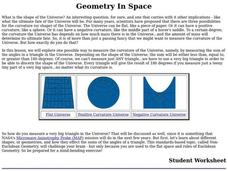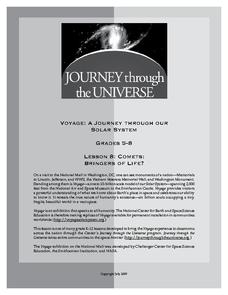Curated OER
Become a Member of the Mission to Mars Team
Students examine the various jobs of the Mars Mission Team, organize them into categories and write a formal application for a position on the Mars Mission. Entries are made into the logbook and on-line Field Journals read.
Curated OER
Sea Surface Temperature Trends of the Gulf Stream
Students use authentic satellite data to produce plots and graphs of sea surface temperature as they explore the seasonal changes of the Gulf Stream.
Curated OER
Geographic Information Systems
Young scholars examine the concept of geographic information systems (GIS) and its basic components. They explore an application program using GIS technology and list the various uses for GIS.
Curated OER
Wow, Saturn Is Much Bigger Than Earth!
Learners compare and contrast the sizes of Earth and Saturn. They create scale illustrations of each planet and label them. They share their models with the class.
Curated OER
Strong as the Weakest Link
Students recognize that compression and tension forces are important considerations in building structures. They construct their own building structure using marshmellows and spaghetti to see which structure can hold the most weight.
Teach Engineering
Future Flights: Imagine Your Own Flying Machines!
What will flying look like in the future? The 21st lesson plan in a 22-part unit on aviation reviews the major aspects of the lesson plan. Pupils brainstorm ideas of a future flying machine.
Florida Center for Instructional Technology
Communicating with Mentors
Nothing says 21st century learning skills like an Internet-based collaborative learning lesson plan focused on using technology to compile and synthesize information. An embedded video shows you what collaborative learning in high school...
Curated OER
Geometry In Space
How can we identify shapes in the Universe? High schoolers will compare and contrast elliptic and hyperbolic geometry. They will also explore one possible way to measure the curvature of the Universe, namely, by measuring the sum of the...
Curated OER
Voyage: A Journey Through Our Solar System
Thoroughly written, this plan walks you through every detail of having your high school astronomers design scale models of the solar system. Complete instructions on building to scale, lesson procedures, and associated worksheets are all...
Curated OER
Rescue Mission Game
Students conduct probability experiments. For this rescue mission lesson plan, sudents play a game and collect statistical data. They organize and interpret the data and determine the probability of success. Students plot points on a...
Teach Engineering
Solar Power
How much solar energy is available at my location? An engaging resource provides a presentation along with script to give the class background information on determining solar radiation. Pupils then work through a worksheet to estimate...
Journey Through the Universe
Comets: Bringers of Life?
Young scientists investigate the elements found in our solar system and then construct a model of a comet. They apply their new knowledge to the formation of the solar system.
Laboratory for Atmospheric and Space Physics
Looking to the Future
New Horizons set forth on a mission to Pluto in 2006. Ten years later, the spacecraft is still on its way. Here, enthusiastic scholars predict what they will be like—likes, dislikes, hobbies, etc.—when New Horizons arrives at its...
University of Colorado
Using Spectral Data to Explore Saturn and Titan
Saturn's rings are made of dust, ice, and solid chunks of material. Individuals use spectrographs in this final installment of 22 lessons to determine the atmospheric elements. They analyze spectrums from Titan's atmosphere and Saturn's...
University of Colorado
Astro-Chronology
Class members play a version of the game Chronology to determine when certain scientific events occurred in history. Teams play until someone has 5-10 events in the correct order.
Messenger Education
Sensing the Invisible: The Herschel Experiment
The electromagnetic spectrum includes everything from very powerful gamma rays (which are used to treat cancer) to much weaker radio waves (which include microwaves). Through a hands-on activity, scholars explore the temperature...
Cornell University
Predicting Chemical Reactions
Prove the Law of Conservation of Mass through a lab investigation. A well-designed instructional activity asks groups to combine materials and monitor indicators for chemical reactions. Measuring the mass of the reactants and products...
Curated OER
Aruba Cloud Cover Measured by Satellite
Students analyze cloud cover over Aruba. They compose and submit written conclusions which include data, analysis, errors in data collection, and references.
Curated OER
Rotating Rings of Ice
Students work together to develop a model of Saturn and its rings. They identify what types of materials make up the rings and how they revolve around Saturn. They write a short paragraph describing the rings.
Curated OER
Celebrating Saturn and Cassini
Students use their notes from previous lessons to write a paper on Saturn or Cassini. They share their writings with the class. They discover how everyone has a different learning style.
Curated OER
Gas Properities Definitions
Students, after reading the Web page Gas Properties Definitions, complete the activity to demonstrate an understanding of the properties of gases.
Curated OER
Experiment: Faster Air = Lower Air Pressure 2
Students experiment to observe air current and pressure.
Curated OER
Where Does My Energy Come From?
Learners gain an understanding that the Sun is the source of all energy. With a partner, they examine various web sites to explore food chains and food webs, later sharing their findings with the class.
Curated OER
Dancing Paper: Static Charge, Science
Students use glass, plastic, paper and various other materials to investigate the properties of static charge and develop scientific inquiry skills.

























